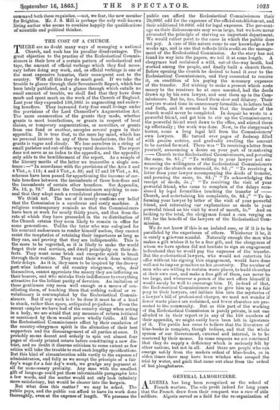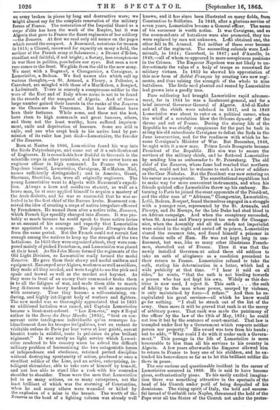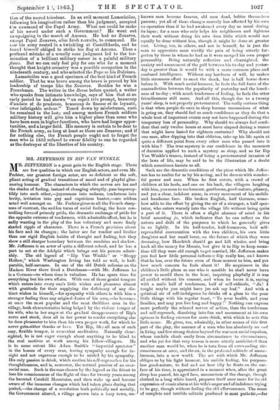GENERAL LAMORICIERE.
ALGERIA has long been recognized as the school of French warfare. The sole profit indeed for long years that the French drew from their conquest was a race of able soldiers. Algeria served as a field for the re-organization of an army broken in pieces by long and destructive wars; we might almost say for the complete renovation of the military forces of France. The restoration of the Imperial Guard as a corps d'ilite has been the work of the Empire, but it was Algeria that gave to France the finest regiments of her soldiery —the Zouaves. At first we read only old names on the pages which record the conquest. A. Bourmont, notorious for treason in 1815; a Clausel, renowned for capacity on many a field, the saviour of the French army at Salamanca ; a Drouet d'Erlon, steadfast and faithful, if not bright; a Savary, less conspicuous in war than in politics, pass before our eyes. But soon a new race comes to the front. We glide from the old to the new army. We meet with a Bugeaud, a Chaugarnier, a Cavaignac, a Lamoriciere, a Bedeau. We find names also which call up various thoughts,—a St. Arnaud, a Fleury, a Pelissier, a Canrobert, are mingled with those of a Maclialion, a Bosquet, a Ladmirault. There is scarcely a conspicuous soldier in the wars of the East and of Italy whose name is not to be found in the records of the conquest of Algeria. And of these a large number gained their laurels in the ranks of the Zouaves or the Chasseurs de Vincennes. But how different have been their fortunes. While some, and these not the best, have risen to high commands and great honours, others, and these not the least worthy, have suffered imprison- ment, exile and deprivation of honours. Some are still in exile, and one who crept back to his native land by per- mission of its ruler has just died—Lamoriciere, the founder of the Zouaves.
Born at Nantes in 1806, Lamoriciere found his way into the Ecole Polytechnique, and came out of it a sub-lieutenant of Engineers. It is remarkable how fruitful in Generals is the scientific corps in other countries, and how we never have an engineer officer in high command. In France there are Napoleon himself, Lamoriciere, Cavaignac, MacMahon, Niel, names sufficiently distinguished ; and in America, Grant, Sherman, Sheridan, Lee, were all originally engineers. The young Lamoriciere went to Algeria with Bourmont's expedi- tion. Always a keen and assiduous student, as well as a braie man, he at once applied himself to acquire a mastery of the Arab dialects, and he was so successful that he was se- lected to be the first chief of the Bureau Arabe. Bourmont con- ceived the idea of creatin.,r' a corps of native irregulars officered by Frenchmen. He named them after a native tribe, Zouacta, which French lips speedily changed into Zouave. It was pro- bably as much because he could speak to these native levies as on account of his courage and capacity that Lamoriciere was appointed to a company. The Legion EtranOre dates from the same period. But the French could not recruit fast enough among the natives to keep up the strength of the two battalions. In 1833 they were organized afresh, they were com- posed mainly of picked Frenchmen, and Lamoriciere was placed at their head. As Sir John Moore formed the regiments of the Old Light Division, so Lamoriciere really formed the model Zouaves. He gave them their showy and useful uniform and equipment. Encamped near Algiers, workmen as well as soldiers, they made all they needed, and were taught to use the pick and spade and trowel as well as the musket and bayonet. As they were in front of an enemy their commander broke them in to all the fatigues of war, and made them able to march long distances under heavy burdens, as well as manceuvre with accuracy. Thus they became a self-sustaining, en- during, and highly intelligent body of workers and fighters. The now model was so thoroughly appreciated that in 1835 an additional battalion was raised, and Captain Lamoriciere became a lieutenant-colonel. " Les Zouaves," says Et Royal author in the Revue des Deux Mondes (1855), "tout en con- servant cette intelligence individuelle qu'on remarque ha- bituellement dans les troupes irrSgulieres, tout en restaut de veritable enfans de Paris par leur verve et leur gaiete, eurent bientat toute la solidite, toute la precision du plus brillant regiment." It was surely no light service which Lamori- ciere rendered to his country when he solved the difficult military problem of harmonizing the two antagonistic forces of independence and obedience, retained perfect discipline without destroying spontaneity of action, produced at once a steadfast soldier of the Line, and an active, enterprising, in- telligent skirmisher, able to take care of himself by himself, and not less able to stand like a rock with his comrades shoulder to shoulder. These were the men that Lamoriciere led in so many actions, on so many enterprises, not the least brilliant of which was the storming of Constantine, when he and many others were wounded or killed by the explosion of a mine in the breach. The worth of the Zouaves as the head of a fighting column was already well known, and it has since been illustrated on many fields, from Constantine to Solferino. In 1840, after a glorious service of seven years, Lamoriciere became a General officer. The name of his successor is worth notice. It was Cavaignac, and as the commandants of battalions were also promoted, they too were replaced by men not unknown. Lelia obtained one, the other fell to St. Arnaud. But neither of these ever became colonel of the regiment. The succeeding colonels were Lad- mirault, in 1844; Canrobert, in 1847; and d'Aurelle, in 1849,—all of whom re-appeared in more conspicuous positions in the Crimea. The Emperor Napoleon was not likely to un- der-estimate the value of a body of troops so renowned for military virtues. In 1852 he showed his appreciation of this new form of Soldat Francais by creating two new regi- ments, and thus raising the strength of the whole to nine battalions. The little seed planted and reared by Lamoriciere had grown into a goodly tree.
Pure soldiering had brought Lamoriciere rapid advance- ment, for in 1844 he was a lieutenant-general, and for a brief interval Governor-General of Algeria. Abd-el-Kader and all the chiefs were subdued in 1847, and in 1848 Lamoriciere was about to enter on a political career, when the whiff of a revolution blew the Orleans dynasty off the throne and out of France. During the stormy life of the Republic he was chiefly conspicuous for the part be took in aiding his old subordinate Cavaignac to defeat the Reds in the June insurrection, and for the readiness with which he be- came Cavaignac's Minister of War. But December, 1848, brought with it a new man. Prince Louis Bonaparte became President of the Republic. His aim was to secure the services of the military chiefs, and he flattered Lamoriciere by sending him as ambassador to St. Petersburg. The old chief of the Zouaves, whose fame had reached that northern capital, could not but be welcome to such a lover of soldiers as the Czar Nicholas. But the President was now entering on his career as a conspirator. The constitutional republican had to make way for more convenient instruments, and when his friends quitted office Lamoriciere threw up his embassy. Re- turning to Paris he joined the stout opponents of the President, and the elder race of "Africans," Changarnier, Lamoriciere, Leila, Bedeau, Bosquet, found themselves engaged in a struggle with a younger race, represented by the St. Arnauds, and Fleurys, and De Morays, for the late Duke had shed blood in an African campaign. And when the conspiracy succeeded, when St. Amend and Fleury proved too much for Changar- nier, when the Assembly and all the chiefs not imperialist were seized in the night and carted off to prison, Lamoriciere shared the common fate, and found himself a prisoner in the classic cells of Ham. He was not kept long in con- finemeut, but was, like so many other illustrious French- men, shovelled out of France. Then it was that the newly installed Government asked these old soldiers to take an oath of allegiance as a condition precedent to their return to France. Lamoriciere refused to take the oath, stating his determination in a letter, which had a wide publicity at that time. " I hear it said on all sides," he wrote, " that the oath is not binding towards a person who has not kept his own. Widely as this doc- trine is now used, I reject it. This oath . . . . the oath of fidelity to the man whose power, usurped by violence, is only maintained by force—I refuse." And then he re- capitulated his great services—all which he knew would go for nothing. " I shall be struck out of the list of the army. Once more it will be proved that rank is at the mercy of arbitrary power. That rank was made the patrimony of the officer by the law of the 19th of May, 1834; he could not lose it but by the sentence of court-martial. That law is trampled under foot by a Government which respects neither person nor property." His sword was torn from his hands ; but he adds, " What could I do with it under such a Govern- ment." This passage in the life of Lamoriciere is more honourable to him than all his services to his country in Algeria. A few years afterwards the Emperor allowed him to return to France to bury one of his children, and he ex- tended his benevolence so far as to let this brilliant soldier die there in peace.
The one curious and questionable incident in the career of Lamoriciere occurred in 1860. He is said to have become pious, enthusiastically pious. To his easily excited imagina- tion there was something attractive in the spectacle of the head of his Church under peril of being despoiled of his dominions. The rising spirit of Italy, the bold and success- ful inroad of Garibaldi into Naples, threatened the hold of the Pope over all the States of the Church not under the proteo-
tion of the sacred tricolour. In an evil moment Lamoriciere, following his imagination rather than his judgment, accepted the command of the Papal Army. What use could he make of his sword under such a Government ? He went out campaigning in the march of Ancona. He had no Zouaves, except Papal Zouaves, alias Irish recruits, to command. He s iw his army routed in a twinkling at Castelfidardo, and he found himself obliged to strike his flag at Ancona. Thus a profound mistake of a usually sane judgment led to the ter- mination of a brilliant military career in a painful military fiasco. But we can only feel pity for one who for a moment thought that knight-errantry was a possible occupation in the nineteenth century, and who selected the Pope as his Duleinea.
Lamorici&e was a good specimen of the best kind of French soldier. That he was brave among the brave is proved by his leadership of troops like the Zouaves. Besides he was a Frenchman. The writer in the Revue before quoted, a writer who speaks from intimate knowledge, says of him that at an early period he had shown " un esprit tres prompt, beaucoup d'audace et de prudence, beaucoup de finesse et de loyaute, avee infatigable ardeur." Toned down by misfortunes, such he remained to the lust; and among modern French soldiers military history will give him a higher place than some who have been seen in higher functions, who have had larger oppor- tunities, and a larger field. His memory is certain to be dear to the French army, as long at least as there are Zouaves; and if for nothing else, the French people ought not to forget the man who in 1852 refused to swear fidelity to one he regarded as the destroyer of the liberties of his country.
































 Previous page
Previous page